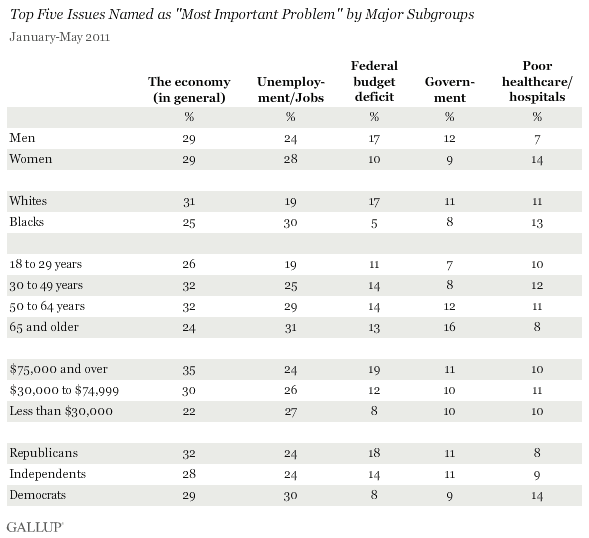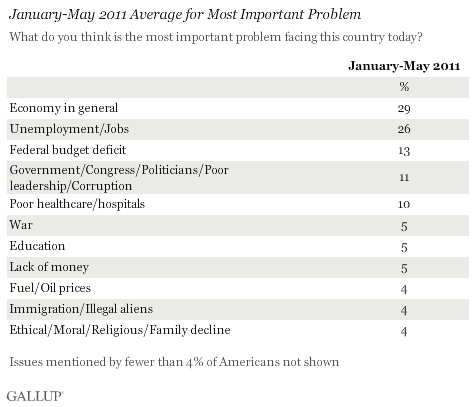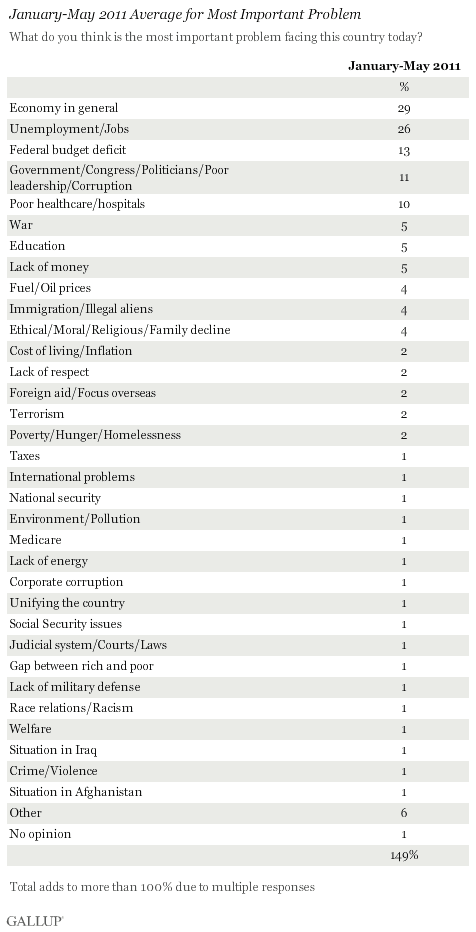PRINCETON, NJ -- All major subgroups of Americans thus far in 2011 have named either "the economy" or unemployment as the nation's top problem, although not necessarily in that order, according to an average of Gallup's monthly Most Important Problem measures from January through May.

Men, whites, adults younger than 65, Republicans, independents, and those earning at least $30,000 per year are all more likely to cite the economy in general than unemployment or jobs. Conversely, unemployment is the top issue for blacks, seniors, and low-income Americans. The two issues tie among women and Democrats.
Additionally, different groups give different relative priority to the budget deficit and healthcare. Men, whites, adults 50 and older, those making at least $75,000, Republicans, and independents are more likely, by a statistically significant margin, to mention the federal budget deficit than they are to cite poor healthcare or hospitals. Other groups give the two issues equal weight, while women, blacks, and Democrats show greater concern for healthcare.
All groups are about equally likely to say dissatisfaction with government is a top problem, although mentions of it are higher among adults 50 and older than among those younger than 50.
These findings are from a combined dataset of Gallup surveys from January through May 2011, consisting of interviews with 5,149 national adults conducted by cell phone and landline.
Twenty-nine percent of all Americans since January have named the economy as the nation's most important problem and 26% have cited unemployment or jobs. Following these, 13% have mentioned the federal budget deficit, 11% some aspect of government leadership, and 10% poor healthcare or hospitals. These constitute all of the issues averaging double-digit mentions in Gallup's monthly Most Important Problem measure to date this year among national adults.
Smaller percentages of Americans have mentioned various other economic and social issues, including education (5%), fuel/oil prices (4%), and immigration (4%).
Several issues that often spark hot political debate or are associated with special-interest groups -- abortion, race relations, the environment, Medicare, and gay rights -- receive mentions of 1% or less each. (See table on page 2 for full results.)

While the overall year-to-date averages reported here are generally similar to Gallup's most recent monthly results, from May, there are some differences. Most notably, the 35% of Americans in May mentioning the economy as the top problem is well above the 22% citing unemployment or jobs. Also, concern about fuel/oil prices has been rising since January, and 8% of Americans in May named the issue as the top problem. At the same time, concern about healthcare fell to 5% from 13%.
Bottom Line
The economy and unemployment have consistently led Gallup's Most Important Problem list since January 2010, with just under 30% of Americans on average mentioning each issue in the first five months of 2011. Despite some differences in the relative importance various subgroups of Americans put on each, all major demographic subgroups, as well as Republicans and Democrats, agree that these are the nation's primary challenges.
The federal budget deficit has been a prominent talking point this year for Republicans in Congress as well as for many Republicans vying to be the 2012 GOP presidential nominee; however, it ranks third in 2011, among both the public at large and rank-and-file Republicans. Concern about healthcare, though down by more than half from where it stood prior to passage of healthcare reform in 2010, is still a significant issue on this list, particularly for Democrats.
Survey Methods
Results are based on telephone interviews conducted as part of five separate Gallup polls conducted between January and May 2011, with a combined sample of 5,149 national adults, aged 18 and older. Survey dates for the four polls are Jan. 7-9, Feb. 2-5, March 3-6, April 7-11, and May 5-8.
For results based on the total sample national adults, one can say with 95% confidence that the maximum margin of sampling error is ±2 percentage points.
Interviews are conducted with respondents on landline telephones and cellular phones, with interviews conducted in Spanish for respondents who are primarily Spanish-speaking. Each sample includes a minimum quota of 400 cell phone respondents and 600 landline respondents per 1,000 national adults, with additional minimum quotas among landline respondents for gender within region. Landline telephone numbers are chosen at random among listed telephone numbers. Cell phone numbers are selected using random-digit-dial methods. Landline respondents are chosen at random within each household on the basis of which member had the most recent birthday.
Samples are weighted by gender, age, race, Hispanic ethnicity, education, region, adults in the household, and phone status (cell phone only/landline only/both, cell phone mostly, and having an unlisted landline number). Demographic weighting targets are based on the March 2010 Current Population Survey figures for the aged 18 and older non-institutionalized population living in U.S. telephone households. All reported margins of sampling error include the computed design effects for weighting and sample design.
In addition to sampling error, question wording and practical difficulties in conducting surveys can introduce error or bias into the findings of public opinion polls.
For more details on Gallup's polling methodology, visit www.gallup.com.
